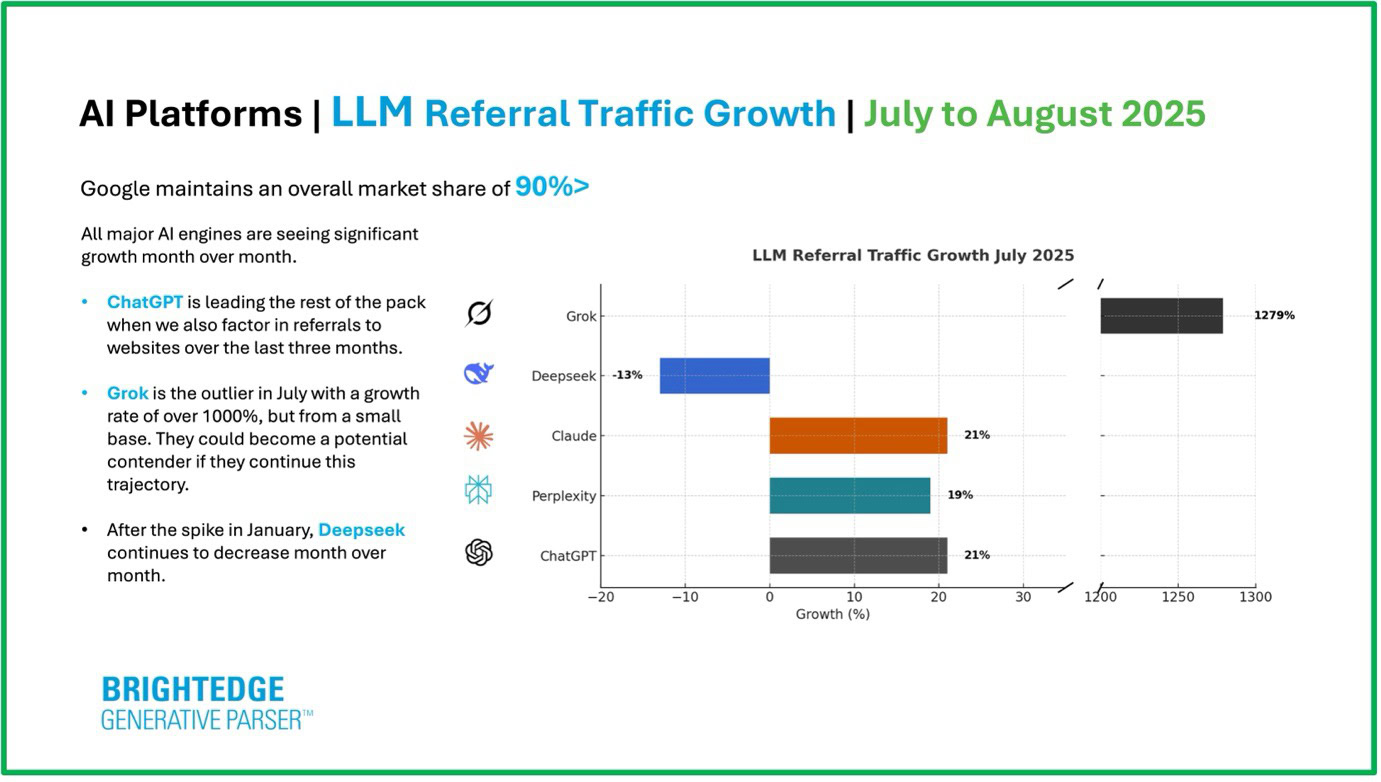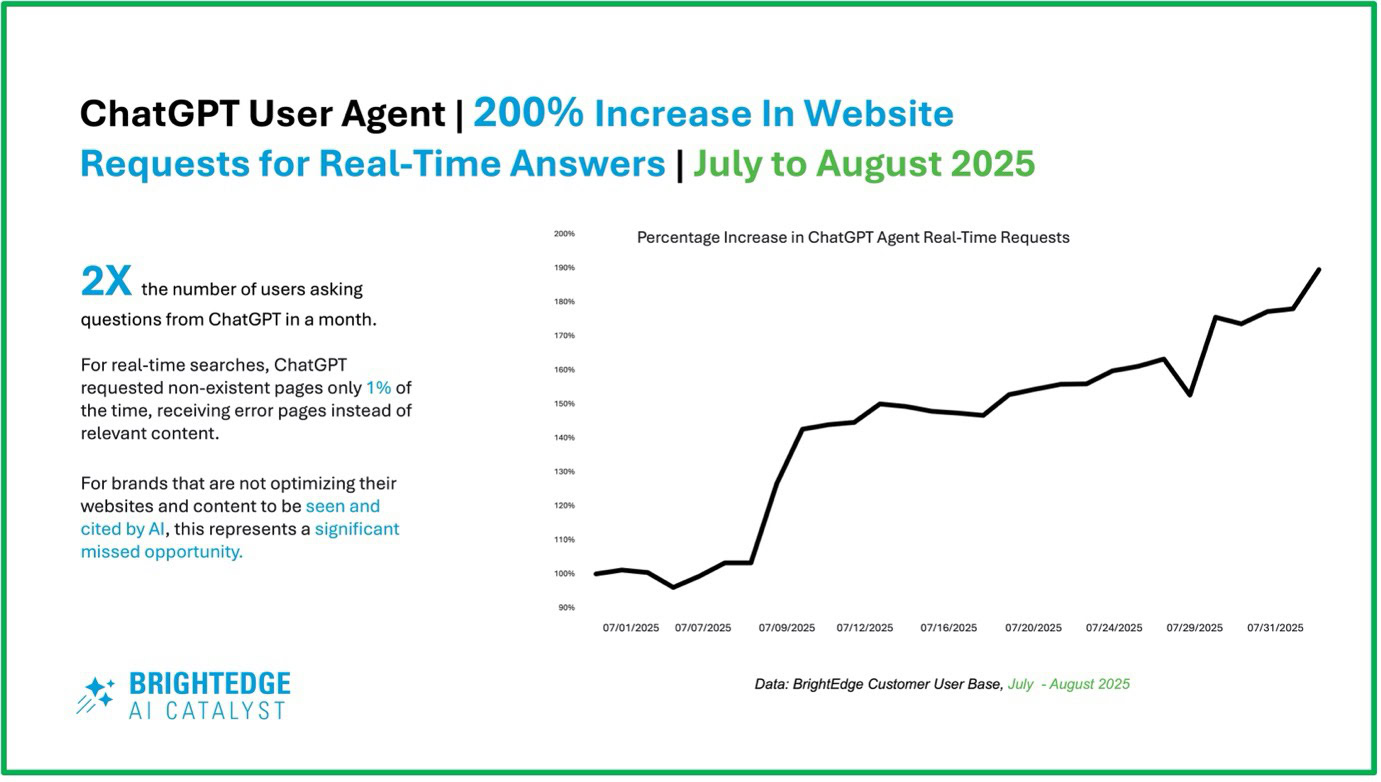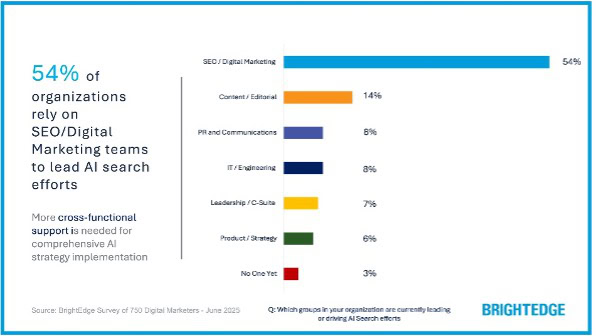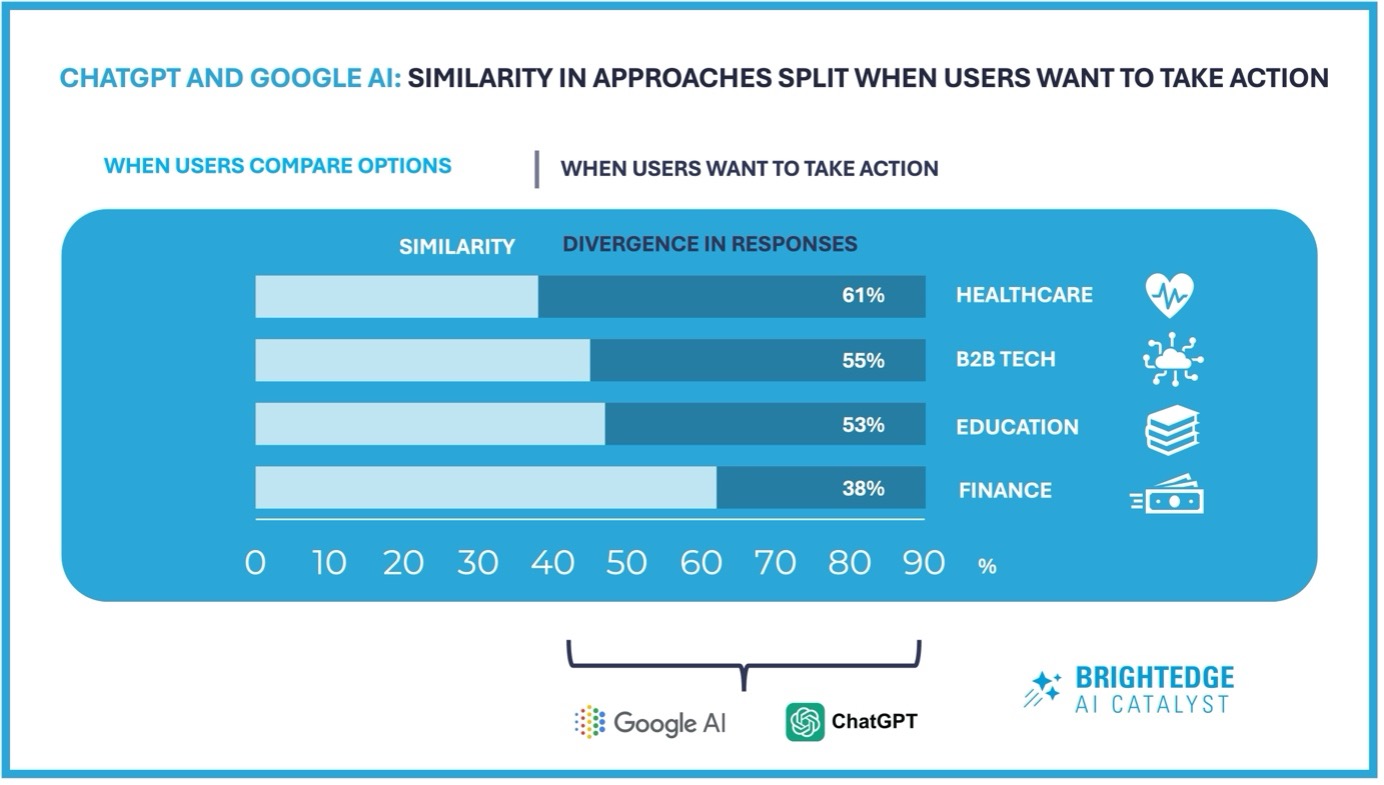Some of the critical questions that are top of mind for both SEOs and CMOs as we head into a multi-search world are: Where is search going to develop? Is ChatGPT a threat or an opportunity? Is optimizing for large language models (LLMs) the same as optimizing for search engines?
In this two-part interview series, I try to answer these questions to provide some clear direction and focus to help navigate considerable change.
What you will learn:
Ecosystem Evolution: While it is still a Google-first world, learn where native AI search platforms are growing and what this means.
Opportunity vs. Threat: Why AI platforms create unprecedented brand visibility opportunities while demanding new return on investment (ROI) thinking.
LLM Optimization Strategy: Why SEO has become more vital than ever, regardless of the AI and Search platform, and where specific nuances to optimize for lie.
CMO Priorities: Why authority and trust signals matter more than ever in AI-driven search.
Organizational Alignment: Why CMOs need to integrate marketing, PR, and technical teams for cohesive AI-first search strategies.
Where Do You Think The Current Search Ecosystem Might Develop In The Next 6 Months?
To answer the first question, I think we are witnessing something really fascinating right now. The search landscape is undergoing a fundamental transformation that will accelerate significantly over the next six months.
While Google still dominates with about 90% market share, AI-powered search platforms are experiencing explosive growth that is impossible to ignore.
Let me put this in perspective. ChatGPT is showing 21% month-over-month growth and is on track to hit 700 million weekly active users.
Claude and Perplexity are posting similar numbers at 21% and 19% growth, respectively. But here is what has caught my attention: Grok has seen over 1,000% month-over-month growth. Source BrightEdge Generative Parser and DataCube analysis, July 2025.
Sure, it is starting from a tiny base, but that trajectory makes it the dark horse to watch. Meanwhile, DeepSeek continues its gradual decline following its January surge, which highlights the volatility in this emerging market. I will share more on that later.
In A Google First World, User Behavior Is Also Evolving On Multiple AI Platforms
What is particularly interesting is how user behavior is evolving. People are not just switching from Google to AI search — they are starting to mix and match platforms based on their specific needs. I am seeing users turn to:
ChatGPT for deep research.
Perplexity for quick facts.
Claude, when they need reliable information.
Google when they want comprehensive breadth.
 Image from BrightEdge, August 2025
Image from BrightEdge, August 2025The CMO AI And SEO Mindset Shift
From a marketing perspective, this creates a massive change in thinking. SEO is not just about Google anymore – though that is still where most of the focus needs to be.
Marketers will need to consider optimizing for multiple AI engines, each with its own distinct data ingestion pipelines. For ChatGPT and Claude, you need clear, structured, cited content that AI models can safely reuse. For Perplexity, timeliness, credibility, and brevity matter more than traditional keyword density.
It is no longer about optimizing just for clicks; it is about optimizing for influence and citations and making sure you appear in the proper context at the right moment within all these distinct types of AI experiences.
The Search Bot To AI User Agent Revolution
ChatGPT and its ChatGPT-User agent are leading the charge.
In July, BrightEdge’s analysis revealed that ChatGPT’s User Agent real-time page requests nearly doubled its activity. In other words, it shows that users relying on real-time web searches to answer questions almost doubled within just one month.
For example, suppose you are looking to compare “Apple Watch vs. Fitbit” from current reviews. In that case, the ChatGPT user agent is acting as your browsing assistant and operating on your behalf, which is fundamentally different from traditional search engines and crawlers.
 Image from BrightEdge, August 2025
Image from BrightEdge, August 2025In summary, I believe the next six months will establish what I term a “multi-AI search world.” Users will become increasingly comfortable switching between platforms fluidly based on what they need in that moment. The opportunity here is massive for early adopters who figure out cross-platform optimization.
Is The Rise Of AI Platforms Like ChatGPT An Opportunity Or A Threat That CMOs Need To Be Aware Of?
It is all opportunity.
Each AI platform is carving out its own distinct identity. Google is doubling down on AI Overviews and AI Mode. ChatGPT is making this fascinating transition from conversational Q&A into full web search integration.
Perplexity is cementing itself as the premier “answer engine” with its citation-first, mobile-focused approach, and they are planning deeper integrations with news providers and real-time data.
Claude is expanding beyond conversation into contextual search with superior fact-checking capabilities, while Microsoft’s Bing Copilot is positioning itself as this search-plus-productivity hybrid that seamlessly blends document generation with web search.
The rise of AI platforms represents both a transformative opportunity and a strategic challenge that CMOs must navigate with sophistication and strategic foresight.
Learn More: How Enterprise Search And AI Intelligence Reveal Market Pulse
CMOs And The Shift From Ranking To Referencing And Citations
And that brings me to a huge mindset shift: We are moving from “ranking” to “referencing.” AI summaries do not just display the top 10 links; they reference and attribute sites within the answer itself.
Being cited within an AI summary can be more impactful than just ranking high in traditional blue links. So, CMOs need to start tracking not just where they rank, but where and how their content gets referenced and cited by AI everywhere.
Technical Infrastructure Requirements And CMOs Leaning Into SEO Teams
On the technical side, structured data and clear information architecture are no longer nice-to-haves – they are foundational. AI relies on this structure to surface accurate information, so schema.org markup, clean technical SEO, and machine-readable content formats are essential.
 Image from BrightEdge, August 2025
Image from BrightEdge, August 2025Brands, The CMO, And The Authority And Trust Premium
Here is something that is becoming critical: Authority and brand trust matter more than ever. AI tends to pull from sites it considers authoritative, trustworthy, and frequently cited. This puts a premium on long-term brand-building, thought leadership, and reputation management across all digital channels.
You need to focus on those E-E-A-T signals (Experience, Expertise, Authoritativeness, Trustworthiness) for both humans and AI algorithms.
The CMOs’ SEO And AI Competitive Advantage
The CMOs who are proactively adapting to these shifts – rethinking measurement, technical SEO, brand trust, and cross-team integration – are the ones positioning their enterprises for continued visibility and influence.
The move to AI-driven search is rapid, but savvy enterprise marketers are seeing this as an opportunity to deepen brand engagement and become a trusted source for both human users and AI engines.
It is challenging, but the potential upside for brands that get this right is enormous.
It is a whole new way of thinking about ROI.
Learn More: How AI Search Should Be Shaping Your CEO’s & CMO’s Strategy
Do You Think Optimizing For LLMs Is The Same As Search Engines, As Google Suggests?
Following Google Search Central Live in Thailand, and Gary’s advice that SEOs don’t need to optimize for GEO, I think that Gary’s absolutely right, and putting any acronym debates behind us, foundational SEO remains the same, particularly with Google search.
SEO has never been more vital, and AI is accelerating the need for specialists in this area. Your website still needs to be fast, mobile-friendly, and technically sound. Search engines and AI systems alike need to crawl and index your content efficiently. Technical optimizations like proper URL structures, XML sitemaps, clean code, and fast loading times are still paying dividends.
The CMO, SEO, And LLM Optimization Fundamentals
Now, when we talk about optimizing for all LLMs, there is a similarity in the reality that success still lies in core SEO – primarily technical SEO – and content fundamentals.
Strong internal linking helps AI crawlers understand how your pages connect. Make sure all pages are easily crawlable. Answer related questions throughout your content using clear headings, schema markup, and FAQ sections, and figure out what people are trying to accomplish to give them the answer and be the cited source in AI results.
LLM Platform-Specific Differentiation
However, as more brands are being discovered and interpreted across multiple AI platforms, it is also vital to understand that each has its own interface, logic, and way of shaping brand perceptions.
Each platform has developed distinct strengths: ChatGPT Search provides a comprehensive narrative context. Perplexity shines with visual integration and related content. Google AI Overview excels at structured, hierarchical information.
Here is a nuanced example. When users ask comparison questions like “what’s the best?,” ChatGPT and Google’s approaches are similar. But when users ask action-oriented questions like “how do I?,” they part ways dramatically. ChatGPT acts like a trusted coach for decision-making, while Google AI remains the research assistant.
 Image from BrightEdge, August 2025
Image from BrightEdge, August 2025Trust Signal Variations
Different platforms also show distinct trust signal patterns. Google AI Overviews tends to cite review sites and community sources like Reddit, asking “what does the community think?”.
ChatGPT appears to favor retail sources more frequently, asking, “where can you buy it?”. This suggests these platforms are developing different approaches to trust and authority validation.
Three-Phase AI Optimization Framework For The CMO And Marketing Teams
Here is a framework for organizations to follow.
Start by tracking your AI and brand presence across multiple AI engines. Monitor how your visibility evolves over time through citations and mentions across AI Overviews, ChatGPT, and beyond.
Next, focus on understanding variations in brand mentions across key prompts. Quickly identify which prompts from ChatGPT, AI Overviews, and other AI search engines generate brand mentions so you can optimize your content efficiently.
Finally, dive deeper into specific prompts to understand why AI systems recommend brands. Utilizing sentiment analysis provides precise insights into which brand attributes each AI engine favors.
Learn More: The Triple-P Framework: AI & Search Brand Presence, Perception & Performance
The CMO: AI, Search, And Cross-Team Integration Thinking
One thing I am seeing work well is tighter integration across marketing and communications teams. Paid and organic strategies must align more than ever because ads and organic AI overviews often get presented together – your messaging, branding, and targeted intent need to be entirely consistent.
Plus, your PR and content teams need better coordination because off-site mentions in media, reviews, and authoritative sites directly influence who gets cited in AI summaries.
Conclusion: Embracing The Multi-AI Search Transformation
The CMOs who are proactively adapting to the shifts are positioning their organizations for sustained competitive advantage in this evolving landscape.
Big Picture, to put this all in perspective.
The 3 Big Questions From CMOs On AI And Search
AI would kill Google: No, it has turbocharged it.
SEO is dead: No, it’s actually more important than ever. AI is reshaping search, which means we need to understand what this transformation entails. Generative Engine Optimization (GEO) builds upon core SEO foundations and requires more integrated, higher-quality technical approaches.
Everything changes? The more things change, the more they stay the same.
In Part 2 of this series, topics covered will include the future of traditional SERP search and how agentic SEO might change the search funnel. Learn how these changes impact the role of SEO and all teams that fall under the CMO remit.
More Resources:
Featured Image: jd8/Shutterstock

